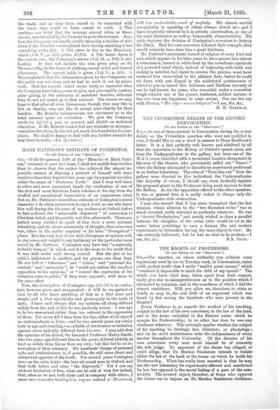MARK PATTISON'S ESTIMATE OF CONINGTON.
rro THE EDITOR OF THE " SPECTATOR." _I SIR,—With the general drift of the "Memoirs of Mark Pattison," reviewed in your last issue, I shall not meddle here further than to observe that the author has achieved the almost impossible success of drawing a portrait of himself still more repulsive than that depicted two years ago by a popular novelist, under the name of "Professor Forth." And I may well leave to other and more competent hands the vindication of one of the first and most laborious Latin scholars of his day from the studied and paradoxical depreciation of an ungenerous rival. But on Mr. Pattison's marvellous estimate of Conington's moral character I do claim permission to say a word, as one who knew him well during the six years of my residence at Oxford, before he had suffered the "memorable shipwreck" of conversion to Christian belief, and frequently met him afterwards. There are, indeed, many entitled to speak of him from a more intimate friendship, and far closer community of thought, than mine ever was, either in his earlier sceptical or his later " Evangelical " phase. But the very fact of our wide divergence of opinion will, in one sense, add weight to my testimony on the particular issue raised by Mr. Pattison. Covington may have had "a naturally irritable temper," in which case it is the more to his credit that it was held under such strong control. But the gist of his critic's indictment is another, and far graver, one than that. He was full of " bitterness " and "spleen," and "personal discontent" and "animosity "; he "could not endure the smallest opposition to his opinions," or "control the expression of his irritation even in public," if they were opposed ; with more to the same effect. .
Now, this description of Conington (pp. 245-52) is no caricature, however gross and exaggerated ; it will be recognised at once by all who know anything of him as a libel pure and simple, and a libel specifically and grotesquely in the teeth of facts. I have said always tbat my opinions all along differed widely from his, and of this he was perfectly aware. I was apt to be too unreserved rather than too reticent in the expression of them. Yet never did I hear from his lips, either while myself an undergraduate or later,—and he was several years my senior both in age and standing,—a syllable of intolerance or irritation against views radically different from his own. I may add that the opinions of his friend, the lamented Professor Henry Smith, who two years ago followed him to the grave, differed latterly at least as widely from his as from my own ; but this led to no interruption of their intimacy. His assailants' charge of personal spite and vindictiveness is, if possible, the still more direct and categorical opposite of the truth. For several years Conington was—as his critic hints—the best all-round man in Oxford, and that both before and after "the shipwreck." Yet I can say without hesitation of him, what can be said of very few indeed, that, often as we met both alone and in company with others, I never once remember hearing hint say an unkind or al-natured, still less uncharitable, word of anybody. His almost morbid scrupulosity in speaking of others always struck me; and I have frequently referred to it in private conversation, as one of his most distinctive as well as honourable characteristics. His critic deplores the decision of Conington's executors to destroy his Diary. Had his own executors followed their example, they would certainly have done him a great kindness.
Mr. Pattison's passionate hatred of religion of every kind and sort, which appears in his later years to have grown into almost a monomania, fanned to white-heat by the unwelcome spectacle of a powerful mind which, instead of beginning with faith and ending in unbelief, had dared to reverse the process, must have rendered him stone-blind to the plainest facts, before he could sit down with pen dipped in the acidulated quintessence of vitriol to put on record this ludicrous and libellous travesty of one he had known for years, who concealed under a somewhat rough exterior one of the purest, tenderest, noblest natures it has ever been my happiness to come across. One can but say with Horace, "Hic nigrce smelts loliginis."—I am, Sir, &c.,
H. N. OXENHAM.


































 Previous page
Previous page